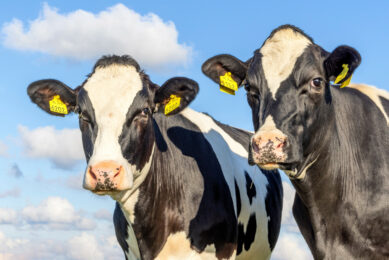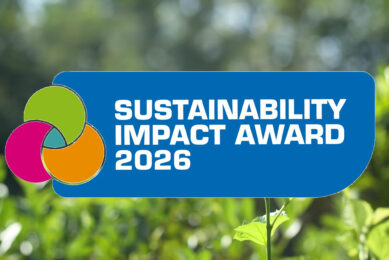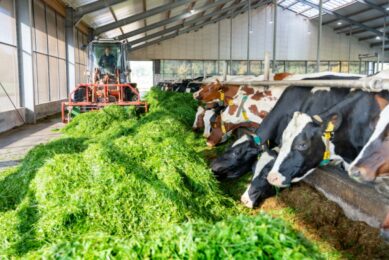Improving the sustainability of animal farming

As the world’s population grows, demand for animal protein will continue to rise. To meet this demand sustainably, within planetary limits, will be a big challenge. Do you think it’s an impossible challenge? We don’t.
DSM has been working for decades on sustainability, – it’s the basis of our purpose. DSM strongly believes in balanced, healthy nutrition with animal proteins being a highly nutritious and key part of a balanced, healthy diet. However, like other forms of food production livestock farming comes at a cost. This cost is increasingly evident, and is highly nuanced depending on farming methods, geography and animal species. Nevertheless, the sustainability of mainstream animal production is under increasing scrutiny from the investors, policy makers and consumers. This means that continuing to operate as we have done in the past is not an option. All players involved in the production of animal protein must be aware of the challenges we are facing and we should work together to solve them. And we have seen several examples around the world showing that it is possible, that it can be done. Today, we’re working with everyone – from scientists and business partners, to the World Food Programme and WBCSD – to make this happen and fulfil 5 of the UN’s most important Sustainable Development Goals. This involves, among other things, increasing the sustainability, quality and nutritional content of food – and also of animal feed. Feed is responsible from 50% to 80% of the environmental footprints of animal proteins, similar to the weight it has on the cost of production, and it also plays a critical role in producing health animals and in generating animal proteins with high nutritional value and quality.

Diverse and sustainable animal proteins
The need to provide enough animal protein for a growing population, while reducing the environmental costs of farming will require smart science and innovative solutions. To address this challenge, DSM Animal Nutrition and Health has launched its cutting edge new strategic initiative: We Make it Possible.
Its mission is to lead and help the industry to build a robust and achievable transformation worldwide in animal protein production sustainability, and to accelerate solutions that will foster a brighter future for everyone. A win-win for feed producers, farmers, processors, retailers, consumers and our future generations.

It’s based on addressing 6 key sustainability platforms:
![]() Helping tackle anti-microbial resistance: Anti-microbial resistance (AMR) poses a major societal health threat. The misuse and overuse of antibiotics in human medicine and animal production are 2 of the main reasons for the rise in AMR. Through smart nutrition, DSM’s eubiotics solutions support a healthy animal that helps to minimise the sub-therapeutic use of antibiotics and can also lead to the replacement of antibiotics for growth promotion, thereby reducing the spread of AMR. Balancius for instance consistently improves feed conversion by 3% in broilers and average weight gain by 4-6%, thereby lessening the need for AGPs and supporting sustainable poultry production.
Helping tackle anti-microbial resistance: Anti-microbial resistance (AMR) poses a major societal health threat. The misuse and overuse of antibiotics in human medicine and animal production are 2 of the main reasons for the rise in AMR. Through smart nutrition, DSM’s eubiotics solutions support a healthy animal that helps to minimise the sub-therapeutic use of antibiotics and can also lead to the replacement of antibiotics for growth promotion, thereby reducing the spread of AMR. Balancius for instance consistently improves feed conversion by 3% in broilers and average weight gain by 4-6%, thereby lessening the need for AGPs and supporting sustainable poultry production.
![]() Reducing our reliance on marine resources: Currently, 76% of the worlds’ fisheries are either depleted or over-exploited so aquaculture plays a critical role now and in the future. But aquaculture growth is heavily dependent on finite marine resources for fish feed, particularly omega-3 EPA and DHA found in fish oil. DSM formed a JV with Evonik to address this issue. Veramaris produces highly concentrated algal omega-3 EPA and DHA oil using naturally occurring marine algae in a waste free, highly sustainable large scale fermentation process.
Reducing our reliance on marine resources: Currently, 76% of the worlds’ fisheries are either depleted or over-exploited so aquaculture plays a critical role now and in the future. But aquaculture growth is heavily dependent on finite marine resources for fish feed, particularly omega-3 EPA and DHA found in fish oil. DSM formed a JV with Evonik to address this issue. Veramaris produces highly concentrated algal omega-3 EPA and DHA oil using naturally occurring marine algae in a waste free, highly sustainable large scale fermentation process.
Veramaris produces the equivalent amount of omega-3 EPA and DHA to that obtained from 1.2 million tons of wild catch fish – more than the annual catch of the Mediterranean Sea.
![]() Making efficient use of natural resources: Today approximately 50% of the world’s grain harvest and 70% of the world’s soy is used in animal feed. This is cultivated on a limited amount of land and as demand for animal protein grows so does the pressure on land use change for animal feed – a major driver of biodiversity loss. Essentially we must extract more nutrition out of less and reduce the pressure on land use change. This is done by improving the digestibility of these feed raw materials and enabling the greater use of by-products and local feed raw materials. Used globally in broilers, a feed enzyme like ProAct would allow the replacement of 7.2m tons of soybean meal corresponding to 9.0m tons of soy, leading to a lower deforestation pressure of 3.1 million forest area (ha) per year.
Making efficient use of natural resources: Today approximately 50% of the world’s grain harvest and 70% of the world’s soy is used in animal feed. This is cultivated on a limited amount of land and as demand for animal protein grows so does the pressure on land use change for animal feed – a major driver of biodiversity loss. Essentially we must extract more nutrition out of less and reduce the pressure on land use change. This is done by improving the digestibility of these feed raw materials and enabling the greater use of by-products and local feed raw materials. Used globally in broilers, a feed enzyme like ProAct would allow the replacement of 7.2m tons of soybean meal corresponding to 9.0m tons of soy, leading to a lower deforestation pressure of 3.1 million forest area (ha) per year.
![]() Reducing emissions in livestock: With livestock and fish production contributing to 14.5% of our world’s Greenhouse Gas (GHG) emissions, it’s essential that we take action now – especially when you consider that the world will demand an additional 40 million tons of meat and 25 million tons of fish each day by 2026. At DSM we have developed over many years Bovaer*, a cutting-edge technology that directly reduces the methane emissions from ruminants by a minimum of 30% – a highly significant step in the right direction. However, nitrogen and phosphorus emissions from animal production are also very important to address since they are key drivers of land and water eutrophication and biodiversity loss. VevoVitall for instance significantly lowers the pH of the urine, leading to lowered ammonia (nitrogen) emissions from swine operations by up to 20%.
Reducing emissions in livestock: With livestock and fish production contributing to 14.5% of our world’s Greenhouse Gas (GHG) emissions, it’s essential that we take action now – especially when you consider that the world will demand an additional 40 million tons of meat and 25 million tons of fish each day by 2026. At DSM we have developed over many years Bovaer*, a cutting-edge technology that directly reduces the methane emissions from ruminants by a minimum of 30% – a highly significant step in the right direction. However, nitrogen and phosphorus emissions from animal production are also very important to address since they are key drivers of land and water eutrophication and biodiversity loss. VevoVitall for instance significantly lowers the pH of the urine, leading to lowered ammonia (nitrogen) emissions from swine operations by up to 20%.
![]() Improving Lifetime performance of farm animals: Morbidity and mortality due to disease in livestock causes the loss of ~US$ 300 billion annually; the associated environmental cost is also significant. DSM is providing science-led, innovative solutions to extend the lifetime performance of animals and to reduce the occurrence of diseases.
Improving Lifetime performance of farm animals: Morbidity and mortality due to disease in livestock causes the loss of ~US$ 300 billion annually; the associated environmental cost is also significant. DSM is providing science-led, innovative solutions to extend the lifetime performance of animals and to reduce the occurrence of diseases.
DSM has developed proven nutritional programmes for dairy cows that support healthy udder function and help sustain the hooves, leading to healthier cows that remain longer in the herd, producing milk longer, and thereby leading a more productive life. In another example, ProAct protease feed enzyme enables lower protein broiler diets that leads to lower ammonia emissions. The reduction of ammonia in the litter leads to up to 38% improvement in broiler footpad scores, improving animal welfare and reducing economic losses.
![]() Improving the quality of animal proteins, while reducing food loss and waste: There are sufficient calories to feed the global population; however, this is prevented by disproportionate food distribution coupled with more than 1 billion tons of food lost or wasted each year, resulting in about 24% of food calories produced never being eaten.
Improving the quality of animal proteins, while reducing food loss and waste: There are sufficient calories to feed the global population; however, this is prevented by disproportionate food distribution coupled with more than 1 billion tons of food lost or wasted each year, resulting in about 24% of food calories produced never being eaten.
Improving the integral quality of animal proteins via nutritional intervention can limit food waste at each stage of the food supply chain. For example, DSM’s Hy-D (the bioactive form of vitamin D), supports healthy mineral metabolism, leading to a 4% increase in egg shell thickness and a 15% reduction in egg breakages in the whole value chain.
We strongly believe in sustainable food systems and that the livestock industry can transform itself from within to be a part of the solution. We want to play a key role in this transformation by providing tangible and actionable solutions to help create brighter lives for all. Working together we can make it possible!
* Bovaer is still being reviewed by regulatory authorities in USA.
Authors:
David Nickell, VP Sustainability and Business Solutions and
Carlos Saviani, Global Sustainability Lead
Join 13,000+ subscribers
Subscribe to our newsletter to stay updated about all the need-to-know content in the dairy sector, two times a week.






